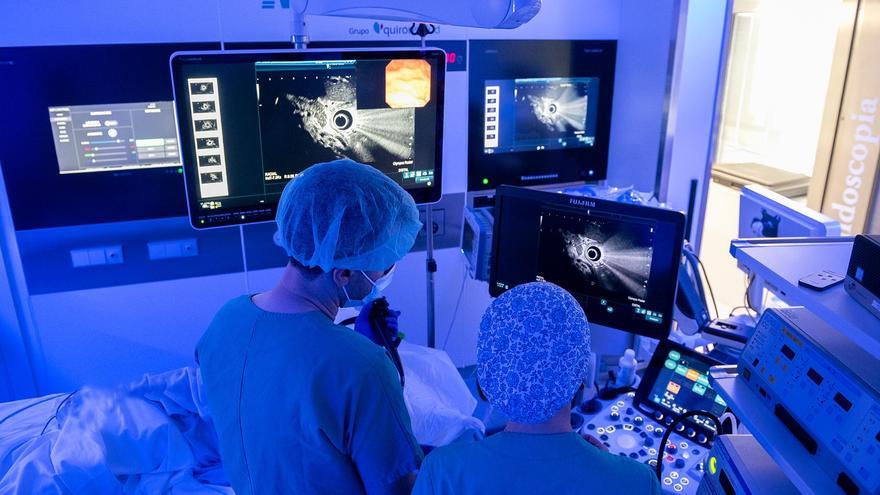Ultrasound endoscopy is a minimally invasive procedure for accurate diagnosis and individual treatment of the patient.

The surgical direction of the Rotger Clinic is developed by combining teams and specialists who are experts in the study of diseases of the pancreas and bile ducts, the study of digestive symptoms and the prevention of colon cancer. In all cases, they are diagnosed on an outpatient basis and using minimally invasive methods that avoid open surgery and reach hard-to-reach areas. Finally, samples analyzed in the pathology service provide results that allow individualized treatment for each patient.
The Rotger Clinic has modern endoscopy rooms equipped with an integrated imaging system and the most modern endoscopic ultrasound equipment for the assessment of diseases and the most accurate diagnosis of tumors of the wall of the digestive tract and neighboring organs, such as the pancreas, gallbladder and its ducts, liver, lymph nodes and lungs. This diagnostic test also allows you to determine the extent of tumor damage in the area of their development and the extent of damage to surrounding organs.
Dr. Angel Cañete is an experienced specialist in sampling lesions detected by inserting a needle through the digestive tract under ultrasound guidance. Through various procedures such as “Ecoendoscopy with fine needle aspiration (FNA) or coarse needle biopsy (CNG).” As the doctor explains: “The patient comes in without a diagnosis and leaves with an accurate report that allows them to choose individualized treatment to target each pathology or eliminate the need for treatment.”
Thanks to the technology available in the Rotger Clinic’s surgical department and team of specialists, access to sample difficult areas is achieved, which allows the detection of tumor pathology without the need to intervene in the patient during open surgery. In particular, endoscopy is the most specific method for identifying and studying lesions of the pancreas. Within the Quirónsalud health network, the Rotger Clinic is the reference center for its implementation in the Balearic Islands.
Colonoscopy and Gastroscopy
Specialists from the digestive system medical team at the Rotger Clinic, doctors Angel Cañete and Dr. Isabel Maestro, visit the patient in consultation for diagnostic care and follow-up. They also determine which patients are eligible to undergo additional digestive endoscopic tests, such as gastroscopy or colonoscopy. Tests that involve inserting cameras through natural orifices, such as the mouth or anus, to diagnose and treat digestive problems, without the need for incisions or external scars, and allow for the development of pathologies.
GASTROSCOPY
-
Gastroesophageal reflux studies
-
Chronic abdominal pain
-
Suspicion of celiac disease
-
Resection of lesions of the esophagus, stomach and duodenum
COLONOSCOPY
-
Prevention of colon and rectal cancer
-
Resection of polyps and vascular lesions
In the modern endoscopy rooms of the Rotger Clinic, all these procedures are performed under anesthesia, are painless and do not require hospitalization. The HD imaging endoscopes and electrosurgical tower are state-of-the-art and provide better detection, characterization and treatment of lesions in a single examination, which, when completed in the required time and in full, reduces the number of procedures in the clinic. future.
Prevention
Colon and rectal cancer is the most common cancer in our community, in both men and women. However, this can be prevented by performing tests such as a colonoscopy. Dr. Cañete believes that: “It is strongly recommended that, starting at age 50, you have at least one colonoscopy, despite the absence of any symptoms. If you have a family history of colorectal cancer, it is recommended that you contact outpatient clinics starting at age 40 to plan the best time to begin surveillance based on symptoms, number of cases in the family, and other findings.”. Specialists from the Digestive Medicine Service serve on the center’s Multidisciplinary Digestive Tumor Committee, where complex cases are discussed to suggest the best treatment available in each situation.
